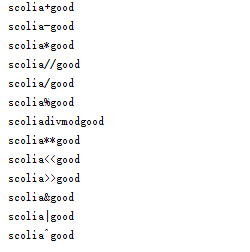在比較的魔法方法中,我們討論了魔法方法其實就是重載了操作符,例如>、<、==等。而這裡,我們繼續討論有關於數值的魔法方法。 1.單目運算符或單目運算函數 __pos__(self) 實現一個取正數的操作(比如 +some_object ,python調用__pos__函數) __neg__(self ...
在比較的魔法方法中,我們討論了魔法方法其實就是重載了操作符,例如>、<、==等。而這裡,我們繼續討論有關於數值的魔法方法。
1.單目運算符或單目運算函數
-
__pos__(self)
-
實現一個取正數的操作(比如 +some_object ,python調用__pos__函數)
-
__neg__(self)
-
實現一個取負數的操作(比如 -some_object )
-
__abs__(self)
-
實現一個內建的abs()函數的行為
-
__invert__(self)
-
實現一個取反操作符(~操作符)的行為。
-
__round__(self, n)
-
實現一個內建的round()函數的行為。 n 是待取整的十進位數.(貌似在2.7或其他新版本中廢棄)
-
__floor__(self)
-
實現math.floor()的函數行為,比如, 把數字下取整到最近的整數.(貌似在2.7或其他新版本中廢棄)
-
__ceil__(self)
-
實現math.ceil()的函數行為,比如, 把數字上取整到最近的整數.(貌似在2.7或其他新版本中廢棄)
-
__trunc__(self)
-
實現math.trunc()的函數行為,比如, 把數字截斷而得到整數.
class Foo(str): def __new__(cls, x, *args, **kwargs): return super(Foo, cls).__new__(cls, x) def __init__(self, x): self.x = x def __pos__(self): return '+' + self.x def __neg__(self): return '-' + self.x def __abs__(self): return 'abs:' + self.x def __invert__(self): return 'invert:' + self.x a = Foo('scolia') print +a print -a print ~a

2.一般算數運算
-
__add__(self, other)
-
實現一個加法.
-
__sub__(self, other)
-
實現一個減法.
-
__mul__(self, other)
-
實現一個乘法.
-
__floordiv__(self, other)
-
實現一個“//”操作符產生的整除操作
-
__div__(self, other)
-
實現一個“/”操作符代表的除法操作.(因為Python 3裡面的division預設變成了true division,__div__在Python3中不存在了)
-
__truediv__(self, other)
-
實現真實除法,註意,只有當你from __future__ import division時才會有效。
-
__mod__(self, other)
實現一個“%”操作符代表的取模操作.
-
__divmod__(self, other)
-
實現一個內建函數divmod()
-
__pow__
-
實現一個指數操作(“**”操作符)的行為
-
__lshift__(self, other)
-
實現一個位左移操作(<<)的功能
-
__rshift__(self, other)
-
實現一個位右移操作(>>)的功能.
-
__and__(self, other)
-
實現一個按位進行與操作(&)的行為.
-
__or__(self, other)
實現一個按位進行或操作(|)的行為.
-
__xor__(self, other)
-
實現一個異或操作(^)的行為
class Foo(str): def __new__(cls, x, *args, **kwargs): return super(Foo, cls).__new__(cls, x) def __init__(self, x): self.x = x def __add__(self, other): return self.x + '+' + other.x def __sub__(self, other): return self.x + '-' + other.x def __mul__(self, other): return self.x + '*' + other.x def __floordiv__(self, other): return self.x + '//' + other.x def __div__(self, other): return self.x + '/' + other.x def __truediv__(self, other): return self.x + 't/' + other.x def __mod__(self, other): return self.x + '%' + other.x def __divmod__(self, other): return self.x + 'divmod' + other.x def __pow__(self, power, modulo=None): return self.x + '**' + str(power) def __lshift__(self, other): return self.x + '<<' + other.x def __rshift__(self, other): return self.x + '>>' + other.x def __and__(self, other): return self.x + '&' + other.x def __or__(self, other): return self.x + '|' + other.x def __xor__(self, other): return self.x + '^' + other.x a = Foo('scolia') b = Foo('good') print a + b print a - b print a * b print a // b print a / b print a % b print divmod(a, b) print a ** b print a << b print a >> b print a & b print a | b print a ^ b

from __future__ import division ....... print a / b

歡迎大家交流
參考資料:戳這裡



